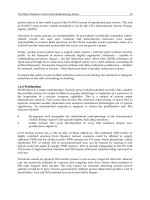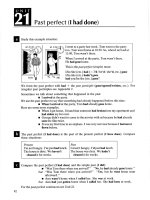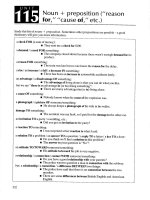The sat in exam 2 ppt
Bạn đang xem bản rút gọn của tài liệu. Xem và tải ngay bản đầy đủ của tài liệu tại đây (63.26 KB, 6 trang )
CHAPTER 1 Introduction to the SAT 1
CHAPTER 2 SAT Study Skills and Strategies 13
CHAPTER 3 The SAT Critical Reading Section 23
CHAPTER 4 The SAT Math Section 99
CHAPTER 5 The SAT Writing Section 181
Appendix A Math Glossary 255
Appendix B Additional Resources 257
Contents
v
5658 SAT2006[FM](fin).qx 11/21/05 6:40 PM Page v
5658 SAT2006[FM](fin).qx 11/21/05 6:40 PM Page vi
ACING THE
SAT
2006
5658 SAT2006[FM](fin).qx 11/21/05 6:40 PM Page vii
5658 SAT2006[FM](fin).qx 11/21/05 6:40 PM Page viii
The 5 W’s
Who,what,where,when,why?If you are taking the SAT this year, these are the most important questions you need
answered. This book will provide you with the answers to these questions. There’s one more big question, how-
ever, and that is how, as in “How do I ace the SAT?” In Chapter 3 of this book, you will review the skills you need
to ace the Critical Reading section of the SAT. Chapter 4 covers essential math skills, and Chapter 5 will give you
all the information you need to know about the Writing section. Every chapter in this book, however, will be use-
ful in your quest to maximize your SAT scores, so read them all carefully.
Who Takes the SAT?
Most college-bound high school students take the SAT, approximately two million every year. If misery loves com-
pany, you must be feeling pretty good right now! Hang in there, though. By the time you finish this book, your
misery will be history. It will be replaced with the confidence that you are going to shine on the SAT.
CHAPTER
Introduction
to the SAT
1
1
5658 SAT2006[01](fin).qx 11/21/05 6:41 PM Page 1
Who Makes the SAT?
The College Board is an association of colleges and
schools that makes the exam. It retains the Educational
Testing Service (ETS
®
) to develop and administer the
SAT. You may already be familiar with ETS; they also
write and administer the Advanced Placement (AP
®
)
tests as well as the PSAT/NMSQT
®
you may have taken
as a junior and/or sophomore. The ETS has a distinc-
tive style of writing five-choice (or multiple-choice) and
grid-in questions, which makes it easy to describe and
analyze the kinds of questions you are likely to see on
the SAT. However, the essay portion of the Writing
section will require a different type of preparation than
the other kinds of questions. This book will prepare you
for all types of SAT questions.
What Is the SAT?
The SAT is one of the main standardized tests colleges
use to evaluate reading, writing, and mathematical
skills in prospective students. Another test, the Amer-
ican College Testing (ACT) Program Assessment, is
designed primarily to measure what you’ve learned in
various academic subjects, while the SAT aims prima-
rily to measure the critical thinking skills you will find
useful in your academic career. Naturally, members of
the College Board (and others) believe that possessing
these skills will help you perform better in your higher
education. That’s why you’re smart to be using this
book. You are developing your intellectual assets, mak-
ing yourself look more attractive to the colleges you’re
interested in, and giving yourself a head start on your
college career.
You may also be planning to take one or more of
the SAT II™ subject tests. These exams test your knowl-
edge of specific subjects, such as history, the sciences,
and languages, and are based on what you have learned
in school rather than on your test-taking skills.
What Is the SAT Used For?
Colleges use your SAT scores as part of an evaluation
process to decide whether you will be a good addition
to their student body. Look at the preceding sentence
again. What word leaps out at you? It’s the word part.
What other things do colleges look at? The short
answer is everything. The good news for students who
don’t have perfect grade point averages and who may
not have perfect SAT scores is that colleges look at indi-
viduals, not just at scores and grades. Are you an ath-
lete? Of course colleges consider that. Are you a
performer—a dancer or an actor? Colleges want peo-
ple who can contribute to campus cultural life. Are
you active in your community as a volunteer? Colleges
know that high school students who contribute to their
communities also are positive members of college com-
munities. Do you love literature but can’t bring your-
self to study anything else? College admissions
committees know that even Einstein flunked a math
course or two.
The important thing is for you to present yourself
as a strong candidate for admission by letting your best
qualities shine through in your application. Think of a
photographer shooting a still-life scene, arranging all
the different elements of the picture to make them look
as interesting as possible and adjusting the light to
bring out the best in the objects she captures on film.
When presenting yourself to colleges, show yourself in
the best possible light, and don’t forget to highlight all
the qualities that make you who you are. They are
looking for all kinds of people to make up a diverse stu-
dent body. So, don’t sweat the SAT. Getting nervous
about it won’t help you anyway. As long as you follow
through with your plan to prepare for it, your score can
help you become an attractive candidate.
–INTRODUCTION TO THE SAT–
2
5658 SAT2006[01](fin).qx 11/21/05 6:41 PM Page 2









